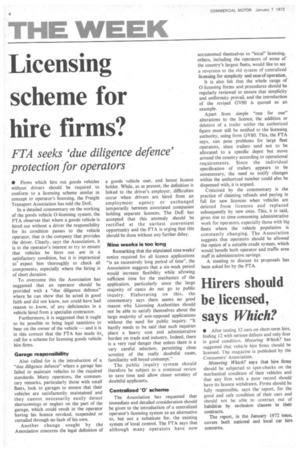Licensing scheme for hire firms?
Page 8

If you've noticed an error in this article please click here to report it so we can fix it.
FTA seeks 'due diligence defence' protection for operators
• Firms which hire out goods vehicles without drivers should be required to conform to a licensing scheme similar in concept to operator's licensing, the Freight Transport Association has told the DoE.
In a detailed commentary on the working of the goods vehicle 0-licensing system, the FTA observes that where a goods vehicle is hired out without a driver the responsibility for its condition passes to the vehicle operator, that is the company that provides the driver. Clearly, says the Association, it is in the operator's interest to try to ensure that vehicles he hires out are in a satisfactory condition, but it is impractical to' expect him thoroughly to check all components, especially where the hiring is of short duration.
To overcome this the Association has suggested that an operator should be provided with a "due diligence defence" where he can show that he acted in good faith and did not know, nor could have had reason to know, of any deficiencies in a vehicle hired from a specialist contractor.
Furthermore, it is suggested that it ought to be possible to bring legal sanctions to bear on the owner of the vehicle — and it is in this context that the FTA has made its call for a scheme for licensing goods vehicle hire firms.
Garage responsibility Also called for is the introduction of a "due diligence defence" where a garage has failed to maintain vehicles to the required standards. Many operators, the commentary remarks, particularly those with small fleets, look to garages to ensure that their vehicles are satisfactorily maintained and they cannot necessarily easily detect shortcomings or neglect on the part of the garage, which could result in the operator having his licence revoked, suspended or curtailed through no fault of his own.
Another change sought by the Association concerns the legal definition of a goods vehicle user, and hence licence holder. While, as at present, the definition is linked to the driver's employer, difficulties occur when drivers are hired from an employment agency or exchanged temporarily between associated companies holding separate licences. The DoE has accepted that this anomaly should be rectified at the earliest convenient opportunity and the FTA is urging that this should be done without any further delay.
Nine weeks is too long Remarking that the stipulated nine weeks' notice required for all licence applications "is an excessively long period of time", the Association suggests that a six-week period would increase flexibility while allowing sufficient time for the mechanics of the application, particularly since the large majority of cases do not go to public inquiry. Elaborating on this, the commentary says there seems no good reason why Licensing Authorities should not be able to satisfy themselves about the large majority of non-opposed applications without the need for public inquiry. "It hardly needs to be said that such inquiries place a heavy cost and administrative burden on trade and industry. Indeed, there is a very real danger that unless there is a very careful selection, permitting close scrutiny of the really doubtful cases, familiarity will breed contempt."
The public inquiry system should therefore be subject to a continual review to save time and allow closer scrutiny of doubtful applicants.
Centralized '0' scheme The Association has requested that immediate and detailed consideration should be given to the introduction of a centralized operator's licensing system as an alternative to, but not a substitute for, the existing system of local control. The FTA says that although many operators have now accustomed themselves to "Ideal" licensing, others, including the operators of some of the country's largest fleets, would like to see a reversion to the old system of centralized licensing for simplicity and ease of operation.
It is also felt that the whole range of 0-licensing forms and procedures should be regularly reviewed to ensure that simplicity and uniformity prevail, and the introduction of the revised GIT80 is quoted as an example.
Apart from simple "one for one" alterations to the licence, the addition or deletion of a trailer within the authorized figure must still be notified to the licensing authority, using form G1180. This, the FTA says, can pose problems for large fleet operators, since trailers tend not to be allocated to a specific depot but move around the country according to operational requirements. Since the individual specification of trailers appears to be unnecessary, the need to notify changes within the authorized number could also be dispensed with, it is argued.
Criticized by the commentary is the practice of claiming refunds and paying in full for new licences when vehicles are . deleted from licences and replaced subsequently by new ones. This, it is said, gives rise to time-consuming administrative work for operators, especially those with big fleets where the vehicle population is constantly changing. The Association suggests that operators should be allowed the option of a suitable credit system, which would benefit both operator and traffic area staff in administrative savings.
A meeting to discuss its proposals has been asked for by the FTA.




















































































